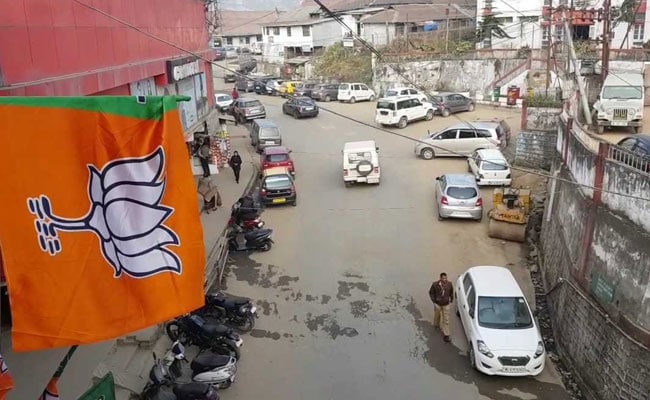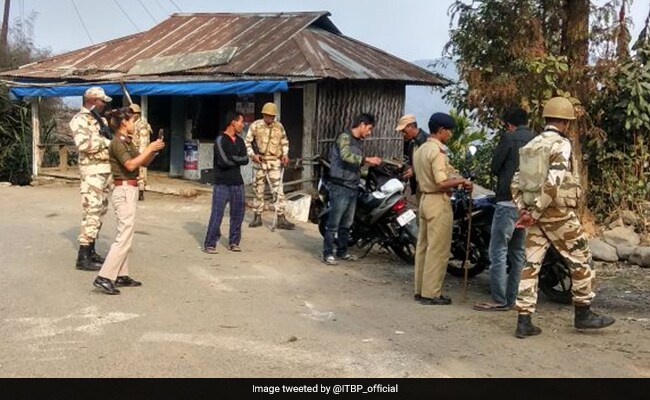Nagaland is waiting for the final outcome of the Framework Agreement signed in 2015
Kohima:
When Prime Minister Narendra Modi lands at Dimapur airport in Nagaland later this month and drives out in a car, he won't be able to miss the large banners that have been set up at eye level on the both sides of the road with one slogan emblazoned on them, mostly in red - "No solution, no election".
This four-word slogan is dominating election debates in Nagaland. Initially, "solution" seemed to have won the day. But then "election" has prevailed. For now. Nagaland votes on 27 February.
The Prime Minister will know what the "solution-election" slogan is all about. On 3 August 2015, eight months after he was chief guest at the iconic Hornbill music festival in capital Kohima, PM Modi had seemed to take a giant leap in the right direction.
That day, the centre and the Naga armed group in ceasefire mode since 1997, the Nationalist Socialist Council of Nagaland (Isak-Muivah), had signed a "Framework Agreement" for a solution to the seven-decade-long Naga insurgency. PM Modi had been present along with the 'M' of NSCN-IM, Thuingaleng Muivah. Isak Swu, the other leader, was ailing and could not attend the event; he died shortly thereafter.
At the event at the Prime Minister's residence, PM Modi had said, "Today, we mark not merely the end of a problem, but the beginning of a new future. We will not only try to heal wounds and resolve problems, but also be your partner as you restore your pride and prestige."
The mood at Camp Hebron, the headquarters of the NSCN-IM, 40 km from Dimapur airport, had turned upbeat since then. A solution seemed neigh.
 Initially, the armed group had wanted a separate country. From the 1940s, they fought for it with guns. In 1997, after talks with almost every successive Prime Minister, they agreed to a ceasefire and starting talks on some other arrangement.
Initially, the armed group had wanted a separate country. From the 1940s, they fought for it with guns. In 1997, after talks with almost every successive Prime Minister, they agreed to a ceasefire and starting talks on some other arrangement.
But, ever since the elections were announced end-January, there is anger and disquiet. Mr Hukavi Yepthomi, the kilo kilonser or home minister of the self-proclaimed Government of the People's Republic of Nagalim (GPRN), who agreed to a rare interview with NDTV said, "Last time when PM visit Nagaland, he told Naga people that as a Christmas gift Naga issue would be resolved by 2017. So people expected the issue will come before election. But why has the government of India imposed elections on us instead? Why is the government cheating us?"
The outburst is quickly toned down. There is too much at stake. Ningkhan Shimray, commander in chief of the Naga Army, says, "In the past we were enemies but after framework agreement, we have become friends, partners, coexisting as two separate entities based on shared sovereignty. I would rather foreclose on that. We want peace."
But on what is shared sovereignty, there is little explanation from the political and military circles. If the Framework Agreement - now three years old - has the answers, no one knows about it -- does it mean a separate flag, separate currency or separate passport? And what about the key issue - geography.
The NSCN-IM's vision is of greater Nagaland or Nagalim, spreading over all Naga populated areas of Manipur, Assam and Arunachal Pradesh. And even Myanmar.
 Nagaland, as it exists today, is about 16,000 square kilometres. The Nagalim concept is, however, 1,20,000 sqkm.
Nagaland, as it exists today, is about 16,000 square kilometres. The Nagalim concept is, however, 1,20,000 sqkm.
Given the huge uncertainty, most in Nagaland wanted the solution first. But they got elections instead and the reaction on 29 January - 11 political parties, including the BJP, signed a document saying they will not field candidates for what they called the "imposed" polls. Then BJP broke rank later. Two state leaders who had signed the "no-election" document were suspended. Others were not about to give the BJP a walkover and put out candidate lists as well.
But the solution versus election debate is raging.
Mars Longkumar, member of the civil society group ACAUT, who has since resigned from the body, said, "As any Naga patriot, solution should have been first priority. If solution had come, it would have demonstrated the seriousness of the government. But to thrust elections upon us is not acceptable."
Former bureaucrat and IAS officer KK Sema has been persuaded to fight the election on a Congress ticket. "It has to be election first because we basically need to govern ourselves. We are going at out of tune, out of gear and we cannot allow this to continue. Also, you need a government in place when solution comes," KK Sema said.
This four-word slogan is dominating election debates in Nagaland. Initially, "solution" seemed to have won the day. But then "election" has prevailed. For now. Nagaland votes on 27 February.
The Prime Minister will know what the "solution-election" slogan is all about. On 3 August 2015, eight months after he was chief guest at the iconic Hornbill music festival in capital Kohima, PM Modi had seemed to take a giant leap in the right direction.
That day, the centre and the Naga armed group in ceasefire mode since 1997, the Nationalist Socialist Council of Nagaland (Isak-Muivah), had signed a "Framework Agreement" for a solution to the seven-decade-long Naga insurgency. PM Modi had been present along with the 'M' of NSCN-IM, Thuingaleng Muivah. Isak Swu, the other leader, was ailing and could not attend the event; he died shortly thereafter.
At the event at the Prime Minister's residence, PM Modi had said, "Today, we mark not merely the end of a problem, but the beginning of a new future. We will not only try to heal wounds and resolve problems, but also be your partner as you restore your pride and prestige."
The mood at Camp Hebron, the headquarters of the NSCN-IM, 40 km from Dimapur airport, had turned upbeat since then. A solution seemed neigh.

A BJP flag flutters above a street in Kohima, Nagaland's capital, as the state prepares for elections
But, ever since the elections were announced end-January, there is anger and disquiet. Mr Hukavi Yepthomi, the kilo kilonser or home minister of the self-proclaimed Government of the People's Republic of Nagalim (GPRN), who agreed to a rare interview with NDTV said, "Last time when PM visit Nagaland, he told Naga people that as a Christmas gift Naga issue would be resolved by 2017. So people expected the issue will come before election. But why has the government of India imposed elections on us instead? Why is the government cheating us?"
The outburst is quickly toned down. There is too much at stake. Ningkhan Shimray, commander in chief of the Naga Army, says, "In the past we were enemies but after framework agreement, we have become friends, partners, coexisting as two separate entities based on shared sovereignty. I would rather foreclose on that. We want peace."
But on what is shared sovereignty, there is little explanation from the political and military circles. If the Framework Agreement - now three years old - has the answers, no one knows about it -- does it mean a separate flag, separate currency or separate passport? And what about the key issue - geography.
The NSCN-IM's vision is of greater Nagaland or Nagalim, spreading over all Naga populated areas of Manipur, Assam and Arunachal Pradesh. And even Myanmar.

Policemen check people on the streets in Nagaland as the state prepares to go to polls
Given the huge uncertainty, most in Nagaland wanted the solution first. But they got elections instead and the reaction on 29 January - 11 political parties, including the BJP, signed a document saying they will not field candidates for what they called the "imposed" polls. Then BJP broke rank later. Two state leaders who had signed the "no-election" document were suspended. Others were not about to give the BJP a walkover and put out candidate lists as well.
But the solution versus election debate is raging.
Mars Longkumar, member of the civil society group ACAUT, who has since resigned from the body, said, "As any Naga patriot, solution should have been first priority. If solution had come, it would have demonstrated the seriousness of the government. But to thrust elections upon us is not acceptable."
Former bureaucrat and IAS officer KK Sema has been persuaded to fight the election on a Congress ticket. "It has to be election first because we basically need to govern ourselves. We are going at out of tune, out of gear and we cannot allow this to continue. Also, you need a government in place when solution comes," KK Sema said.
Track Latest News Live on NDTV.com and get news updates from India and around the world

